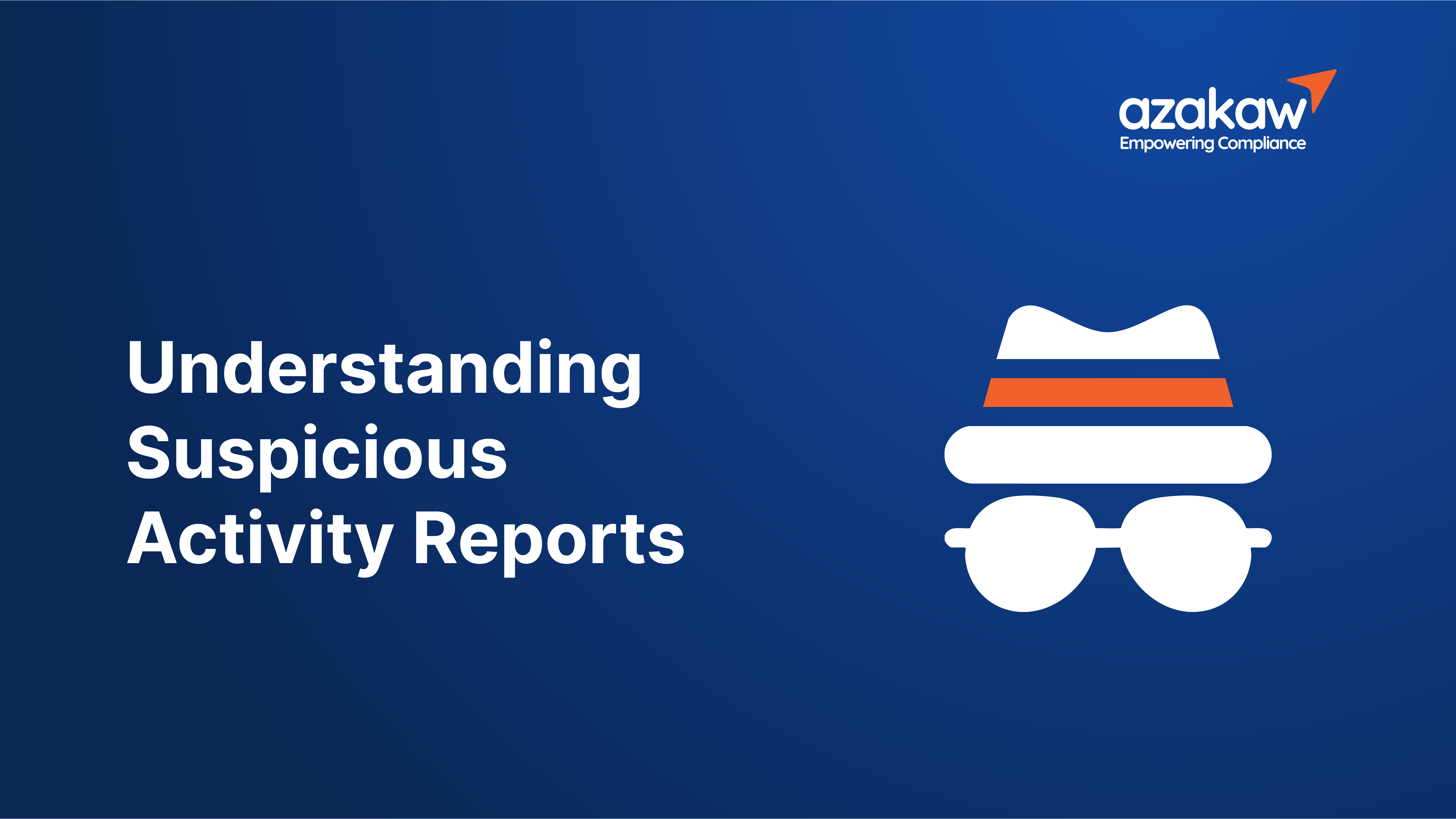In the global fight against financial crime, Suspicious Activity Reports (SARs) and Suspicious Transaction Reports (STRs) are essential tools that enable financial institutions and regulators to identify and mitigate risks such as money laundering, terrorist financing, and fraud. These reports serve as the first line of defence, ensuring that unusual or potentially illegal activities are flagged and appropriately investigated.
This article delves into the fundamentals of SARs and STRs, their significance in regulatory compliance, and how institutions can enhance their reporting practices with advanced RegTech solutions like those offered by azakaw.
What Are SARs and STRs?
Suspicious Activity Reports (SARs)
SARs are filed when a financial institution detects unusual or potentially suspicious behaviour within an account or activity that may not involve an actual transaction. They focus on identifying patterns, actions, or behaviours that deviate from a customer’s normal activity or lack a clear, legitimate purpose.
Suspicious Transaction Reports (STRs)
STRs, on the other hand, are specific to transactions that raise red flags. These may include high-value transactions, those involving high-risk jurisdictions, or transfers that lack economic or legal justification.
Both reports are critical in providing regulators and law enforcement with insights into potential financial crimes, forming the foundation of an effective anti-money laundering (AML) regime.
When to File SARs and STRs
Examples of SAR Triggers
- A customer conducting large cash deposits inconsistent with their profile.
- Frequent account activity that suddenly stops or dramatically changes.
- A new account showing high transaction volumes with no clear source of income.
Examples of STR Triggers
- Transfers to or from jurisdictions on a sanctions or high-risk watchlist.
- Repeated transactions just below a reporting threshold.
- Unusual patterns in trade finance or cross-border payments.
The Regulatory Framework
SARs and STRs are central to global efforts against financial crime, governed by both international and regional regulations:
Global Standards
- The Financial Action Task Force (FATF) sets the benchmark for AML and combating terrorist financing (CFT).
- Reporting suspicious activity is a key obligation under FATF’s recommendations for financial institutions worldwide.
Regional Compliance in the GCC
- The UAE Central Bank requires financial institutions to report SARs and STRs promptly through its goAML platform.
- In the global fight against financial crime, Suspicious Activity Reports (SARs) and Suspicious Transaction Reports (STRs) are essential tools that enable financial institutions and regulators to identify and mitigate risks such as money laundering, terrorist financing, and fraud. These reports serve as the first line of defence, ensuring that unusual or potentially illegal activities are flagged and appropriately investigated. has its guidelines for financial institutions operating in the Kingdom.
- Local regulators in Oman, Bahrain, and Qatar enforce similar frameworks aligned with FATF standards.
Non-compliance with these regulations can result in hefty fines, reputational damage, and even criminal liability.
Challenges in Filing SARs and STRs
While filing these reports is critical, it comes with challenges:
- Subjectivity in Detection: Determining what qualifies as “suspicious” can vary between institutions.
- High Volumes of Data: Identifying red flags amid a sea of transactions can overwhelm teams.
- False Positives: Excessive filing of reports due to fear of non-compliance can burden regulators and dilute investigative focus.
Key Elements of Effective Reporting
Financial institutions can enhance their SAR and STR practices by focusing on:
- Clarity and Accuracy: Reports should include all relevant details, such as customer profiles, transaction data, and reasons for suspicion.
- Timely Filing: Reports must be submitted within regulatory deadlines.
- Confidentiality: Institutions must ensure strict confidentiality to protect the integrity of the reporting process.
- Employee Training: Continuous training on AML and CFT best practices is essential for identifying red flags.
How azakaw Can Help
As a leading RegTech provider, azakaw offers advanced solutions to help financial institutions streamline their compliance processes, including SARs and STRs:
Automated Detection
azakaw leverages artificial intelligence and machine learning to identify patterns and anomalies in financial transactions, enabling faster and more accurate detection of suspicious activities.
Simplified Reporting
Our platform provides seamless integration with regulatory portals, ensuring that SARs and STRs are filed accurately and on time, reducing the risk of non-compliance.
Customizable Solutions
azakaw’s tools are tailored to meet the specific needs of institutions operating in different jurisdictions, ensuring alignment with local regulatory requirements.
Enhanced Monitoring
Our compliance monitoring solutions provide real-time alerts, helping institutions stay ahead of evolving risks.
By reducing manual effort and enhancing precision, azakaw empowers institutions to focus on what matters—protecting their customers and maintaining trust.
Conclusion
SARs and STRs are vital components of any effective compliance framework, enabling financial institutions to play a proactive role in combating financial crime. With increasing regulatory scrutiny and the complexity of financial transactions, institutions must adopt robust systems and processes to meet these obligations effectively.
azakaw is proud to support financial institutions in navigating these challenges with innovative tools and expert guidance. By streamlining the detection and reporting of suspicious activities, azakaw helps institutions stay compliant and contribute to a safer, more transparent financial ecosystem.
For more information on how azakaw can support your compliance journey, contact us today or book a demo to see our solutions in action.
